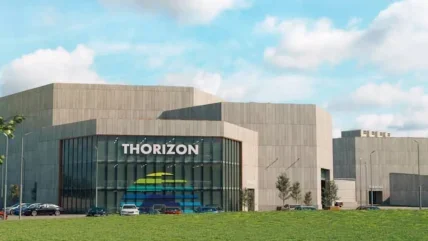
A consortium of Dutch technology companies Thorizon, DEMCON, and VDL Group has forged a project agreement to develop small modular reactors (SMRs), with a special focus on molten salt reactors.
These advanced nuclear reactors are designed to offer a safe, scalable, and sustainable solution for energy transition.
The agreement seeks to validate the manufacturability, safety, and functionality of key components and non-nuclear subsystems for these reactors.
To achieve this, the companies plan to create an advanced testing facility for the development and testing of molten salt reactor technologies.
In October last year, DEMCON, Thorizon, and VDL Group formalised their partnership during a visit by Minister of Climate Policy and Green Growth Sophie Hermans to DIFFER, a research institute in Eindhoven, Netherlands.
The consortium, along with DIFFER, signed a letter of intent to accelerate SMR technology development in the Netherlands.
In December, the partners signed a project agreement to advance SMR technology.
Thorizon CEO Kiki Lauwers said: “For Thorizon, this is a unique opportunity. Companies like VDL and DEMCON have unparalleled experience in realising high-tech projects, from concept to prototype and serial production.
“During our collaboration with DIFFER, we have seen that Brabant offers world-class knowledge and facilities and can act quickly.
“With these partners, we share an ambitious and pragmatic mindset that is crucial for our development and successful collaboration.”
In 2021, the province of Noord-Brabant launched an innovation coalition, aiming to leverage local manufacturing and research to speed up molten salt reactor development.
The Dutch government also envisions a significant role for nuclear energy in the future energy mix. Recently, tech giants like Google, Amazon, and Meta have shown interest in SMRs to power data centres.
In the Netherlands, Thorizon, originally a spin-off from the Nuclear Research and Consultancy Group (NRG), is developing a 100MWe molten salt reactor.
The Thorizon One reactor, described as ‘walk-away safe,’ also prioritises circularity by using long-lived nuclear waste as fuel. Supported by the French government, the reactor has been selected as a key project by the European Commission, the nuclear research firm said.
In March last year, Thorizon and Stellaria working in a consortium with Orano, were selected as winners of the call for projects to develop molten salt reactors under France’s 2030 innovation initiative.
The DIFFER research institute aids its development through its DICE research facility, studying the effects of corrosion, heat, and radiation to optimise material selection.






